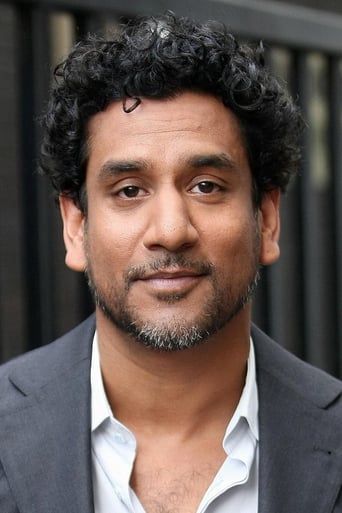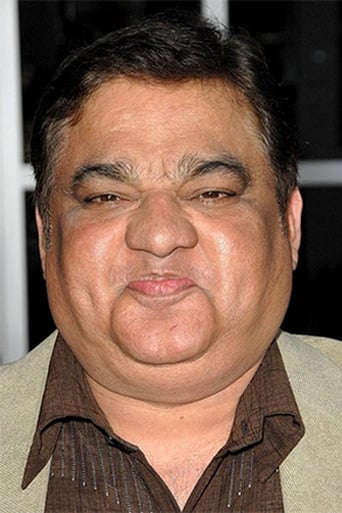WasAnnon
Slow pace in the most part of the movie.
HottWwjdIam
There is just so much movie here. For some it may be too much. But in the same secretly sarcastic way most telemarketers say the phrase, the title of this one is particularly apt.
Keeley Coleman
The thing I enjoyed most about the film is the fact that it doesn't shy away from being a super-sized-cliche;
Yash Wade
Close shines in drama with strong language, adult themes.
Dr Jacques COULARDEAU
A surprising series from the BBC that comes to us from the rather distant time of 1993, but that speaks of the 1970s, the time of punk and the beginning of Margaret Thatcher who was already out when the mini series was produced. And they bring it out in 2007 in the DVD format. At last some may say. These time lags are very interesting because the meaning of the story is completely different according to the time you stand in. At the time of the arrival of Margaret Thatcher, the National Front was a real danger, and the mini-series shows it quite well and it is Margaret Thatcher who thwarted this National Front's ambition completely and utterly by recuperating their votes. It was a time when the left thought along the narrow line of an old model, that of the communist inspired unions, particularly the mineworkers' union, and of the Labor left of Tony Benn, the aristocrat turned a strict socialist. And they needed to be woken up to reality and they were by Margaret Thatcher again. They had to realize the old more or less violent and always intimidating methods were wrong and that the system of the free market economy was not collapsing at all because market economy was not, still is not and will certainly not be collapsing, even if its management is changing and will be changing maybe towards a more controlled, smooth and just functioning. The film looks at the extremely crucial issue of the time: the integration of the massive immigration from South Asia, Pakistan, India and Bangladesh. It considers this movement from a mixed point of view. First of all the point of view of the immigrants themselves, and particularly one young man who is the son of an Indian man and an English woman. His vision is always divided because he is mixing with people from both communities. It shows both his very Indian approach of personal relations that takes sex for what it is, nothing much except some kind of relaxing way of meeting with other people. Then the orientation is not important at all. But at the same time he desires some deep sentimental and emotional commitment and that runs in conflict with the English approach of things that more or less considers commitment like a downfall, a fault, a flaw in the free texture of life at the time. Since he is not an opportunist he ends up stepping out of a group in which sex was some kind of payment for a career, and since his profession is acting, that leads him to some kind of rather aloof position though all the more chased after because he appears hard to catch. At the same time we have the point of view of the white actors and directors who want to give Indians their chance to be well represented on the stage but then these Indians run into the African blacks who do not have the Indian distanciation (the Blacks are not beige enough as this young man says) and who consider a humorous discourse about Indian immigrants to be yielding to the white representation a society they essentially see as racist is imposing onto them. If you add to that the punk music of one of these white friends of the main actor's you have the full picture. This punk movement was definitely on one hand an extreme and excessive denunciation of white fascism but it also led at the time to the antagonistic movement of the skinheads who were racist and violent. In other words that was a time when things were very volatile and changing too fast for anyone to know which way they were going. That was the time of the squatters and the Claimants' Union. Strangely enough though most of these claimants were whites who wanted to use the social protection that had been set up after the war and up to the end of the 60s to live in poor but decent conditions, with no regular profession but plenty of time to prop up all kinds of protest movements. I remember the squats of the White Chapel area and the punk concerts of the Marquee and the Roundhouse of these mid and late mid 70s. That was a time worth living and that is a time worth remembering. This miniseries gives us a fair picture of what could today inspire us slightly more: there is no future for any country and the people of those countries if there is not a fair dose of freedom, diversity and hard work.Dr Jacques COULARDEAU, University Paris Dauphine, University Paris 1 Pantheon Sorbonne & University Versailles Saint Quentin en Yvelines
ytbufflo-1
I am coming out fighting here because this film was so well shot and so well cast that I am twice as angry about its de-evolution than I would have been with a lesser work. Without revealing too much of the plot, I can only say that part one of my 2 VHS set was an unnerving, unfolding delight of bizarre but plausible plot developments. The lead character was suitably naif-like but also intelligent and very very open. The events that he is rapidly forced to come to terms with are the separation of his parents, the culture shock when his Pakistani roots collide with a complete breakdown of English straitlaced society in the sixties, his father's dubious transformation into the revered Buddha of Suburbia, and the turning of his cousin into a feminist militant as his best friend suddenly becomes an icon of the burgeoning punk movement in the seventies. Among other things.What made me so angry was the amount of detailed work each actor put into creating and establishing their characters in the first part, only to have the whole thing devolve into very bad porn episodes in the second part, far too many to justify plot development, and far too explicit to even seem erotic. My biggest pet peeve is when directors let their private fetishes interfere with the truth of their movie, and this to me was a supreme example.I felt a bit like I'd been invited to a party of very clever, funny strangers, only to have the doors locked and the guests not allowed to interact, and all of us forced to watch bad seventies sexploitation films instead. What an insult to the hard work of these amazing actors! Why not just make a cheeseball flick to begin with? And why cast a great lead character who can actually act, and then cut away from him whenever he is building up to a great performance? I almost felt as if he too was growing tired of the endless sex scenes where all he did was lie there pumping his pelvis for yet another breathy naked actress.Bottom line - Part One is minor genius, Part Two is second tier soap opera perversion. I know the book is quite explicit, but I felt that these fine actors were as exploited in real life as their characters were in the movie, and it made me quite angry and very uncomfortable. Only John Waters can pull off such a dubious degrading of actors and plot and have it seem artistic. My suggestion is to only watch the first part, toss the second in the proverbial rubbish heap, and you will love the Buddha forever. Score A+F=0
mbanwait
Having read the novel almost a decade ago and not quite understanding it (probably too young), I finally decided to pick up this BBC series on video. I think i understood it better being 10 years wiser.The series is firmly cemented on the wonderful actor Naveen Andrews (now best known for the ABC series "Lost"). Taking place over a span of a decade, the early 70's to the 80's, when Thatcher came to power, the series is epic in scope. Showcasing the rising tide of the new young Indo-Brits and their dreams, aspirations and longing to belong to a culture of their own (instead of the tradition bound or anglo majority).The series is filled with race relations, morality, social issues and political comment. The character of Karim is in almost every frame of the series. And all of the other characters are seen interplaying with Karim.The most interesting storyline is the at times comical, but ultimately bitter subplot involving the Indian groom Changez and his reluctant British bride Jamila. Wonderful performance by Harish Patel.At times the series does start to meander into meaningless territory, such as the plot involving Charly and the punk rock band. But again, the great acting by Andrews pulls the story back to the forefront.I can compare this series to a very long movie...an excellent 4 hours spent on a great British serial.And one more thing, the soundtrack is a major highlight. Great tunes from the 70's. Not to be missed by Naveen Andrews fans.
Frimmin'
Having enjoyed the quirky little "My Beautiful Laundrette," I was most disappointed by "The Buddha of Suburbia." The film is a disaster from beginning to end, and has the feeling that length was the sole purpose, as one sometimes feels when reading less-inspired 19th-century novels whose authors were paid by the word.There are nearly an hour's worth of shots of people walking up stairs, crossing streets, and standing silently which would have been edited by any other director. There is truly no reason in the world for it to have gone over two hours. Furthermore, the production is shoddy. Lighting is bad, lines are mumbled, blocking awkward.There is no "plot" per se, no shape to this massive mess. There are clues that it goes from the beginning to the end of the 70s, yet the events feel more like a three-year span.The subject simply appears to be the myriad ways in which the people in young Karim's life find to ruin their happiness. Their confusions range from hopeless dedication to old-country ways, (arranged marriages), to faddish spirituality, the constriction of "liberating" politics, disposable families, drugs, etc.With a theme like this, we want a character who struggles against the tides of spiritual emptiness. Karim's mother and brother might have fit the bill as the only characters with common sense, but they are virtually ignored.
Instead, the main character is Karim, who drifts helplessly on the currents that mangle the lives of those close to him. Life simply happens to Karim, everything that transpires is the result of someone else's plans. Only in the latter half of the film does he actually have any kind of goal at all (becoming an actor).Never does he ever rise beyond being more than a helpless figure trying to be "nice," whether that means being a peacemaker, a lover, or a friend, or trying all three to find that none of them work. His relationships happen to him, and when they go south, he is unable do much more than voice a vague sense of complaint.Now characters like this have excellent potential; consider "The Stranger," "Zelig," "The World According to Garp," or "Being There." But Karim is so dedicated to helplessness that our sympathies are never engaged for him.And without a sympathetic character, a memorable line of dialogue, or even a sense of purpose, "The Buddha of Suburbia" is a waste.






